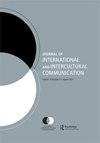Stereotyped Communication: The Ascribed Identities of Nigerians Living in the U.S.
IF 2.2
Q2 COMMUNICATION
Journal of International and Intercultural Communication
Pub Date : 2021-09-17
DOI:10.1080/17513057.2021.1974924
引用次数: 2
Abstract
ABSTRACT This study examined how Nigerians in the U.S. negotiate their identities considering the stereotypes ascribed to them during interactions and strategies for attenuating stereotypes. Interviews with 20 Nigerians revealed that Nigerians were stereotyped positively (i.e., as hardworking, and passionate for education) and negatively (i.e., as fraudsters, kidnappers, and underdeveloped). Also, Nigerians attenuated stereotypes ascribed not only to Nigerians but to Blacks through nationalism, self-awareness, and hard work. Findings challenge beliefs that stereotyping occurs due to the lack of contact with outgroup members. Indeed, stereotyping occurs because of some form of history rather than an absence of history with outgroup members.刻板印象的沟通:生活在美国的尼日利亚人的归属身份
摘要本研究考察了在美国的尼日利亚人如何在交往中考虑到对他们的刻板印象以及减轻刻板印象的策略来协商他们的身份。对20名尼日利亚人的采访显示,人们对尼日利亚人的刻板印象是正面的(例如,努力工作,对教育充满热情)和负面的(例如,骗子,绑架犯和不发达)。此外,通过民族主义、自我意识和努力工作,尼日利亚人不仅淡化了对尼日利亚人的刻板印象,也淡化了对黑人的刻板印象。研究结果挑战了刻板印象的产生是由于缺乏与外部群体成员的接触。事实上,刻板印象的产生是因为某种形式的历史,而不是因为没有与外群体成员的历史。
本文章由计算机程序翻译,如有差异,请以英文原文为准。
求助全文
约1分钟内获得全文
求助全文
来源期刊

Journal of International and Intercultural Communication
COMMUNICATION-
CiteScore
3.80
自引率
12.50%
发文量
19
 求助内容:
求助内容: 应助结果提醒方式:
应助结果提醒方式:


